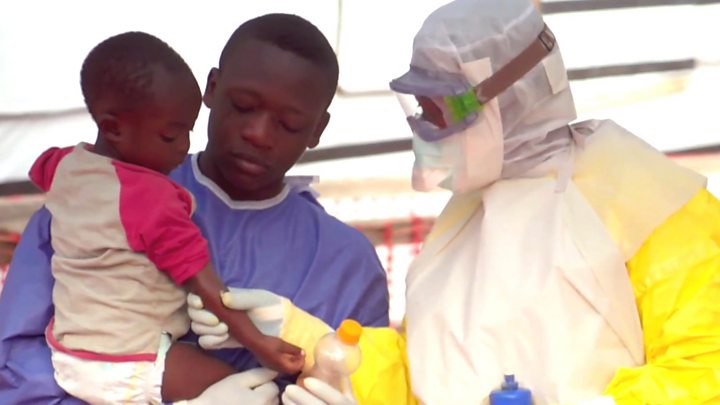Image copyright
Reuters
Almost 1,400 have died in a recent outbreak in neighbouring DR Congo
A five-year-old boy in Uganda has been diagnosed with Ebola, the World Health Organization (WHO) has confirmed.
This is the first case confirmed in the country amid a deadly outbreak in neighbouring Democratic Republic of Congo.
More than 2,000 cases have been recorded there in the last 10 months – most of which have been fatal.
The boy is said to have travelled across the border with his family from DR Congo on Sunday.
He was then taken to a Ugandan hospital after exhibiting symptoms including vomiting blood, officials said.
The diagnosis of Ebola was then confirmed by the Uganda Virus Institute (UVRI) on Tuesday before being announced by officials.
The country’s health ministry and WHO say they have dispatched a rapid response team to identify others at risk, a joint statement said.
Ugandan Health Minister Jane Ruth Aceng told a news conference on Tuesday that the boy’s family members are being monitored, including two who have exhibited Ebola-like symptoms.
She then tweeted that the country had moved into “response mode” following the incident.
Uganda has already vaccinated about 4,700 health workers against the disease, the joint statement by WHO and Ugandan health officials said.

Media playback is unsupported on your device
The outbreak in DR Congo has become the second biggest in history, with a significant spike in new cases noted in recent weeks.
Almost 1,400 people have died of the disease since August.
Only once before has an outbreak been still growing more than eight months after it began – that was the epidemic in West Africa between 2013 and 2016, which killed 11,310 people.
What is Ebola?
- Ebola is a virus that initially causes sudden fever, intense weakness, muscle pain and a sore throat.
- It progresses to vomiting, diarrhoea and both internal and external bleeding.
- People are infected when they have direct contact through broken skin, or the mouth and nose, with the blood, vomit, faeces or bodily fluids of someone with Ebola.
- Patients tend to die from dehydration and multiple organ failure.
